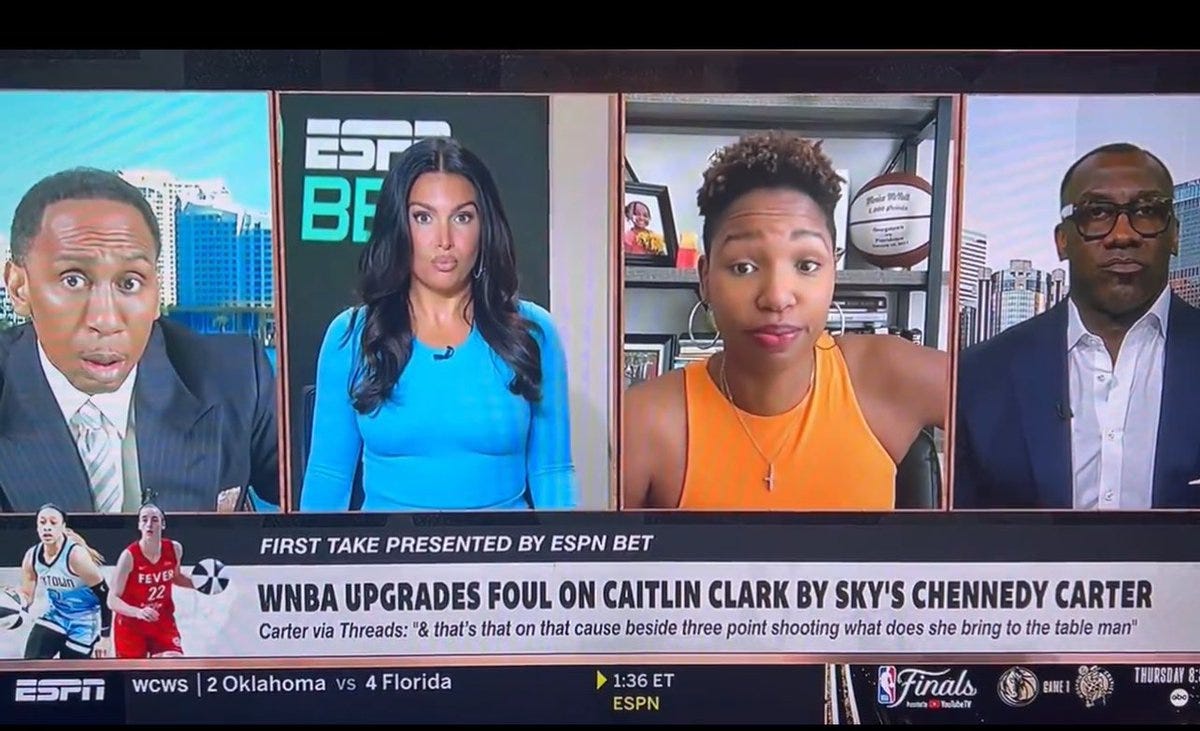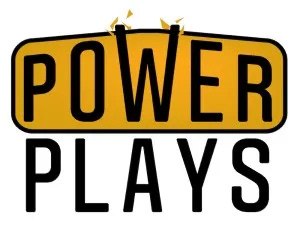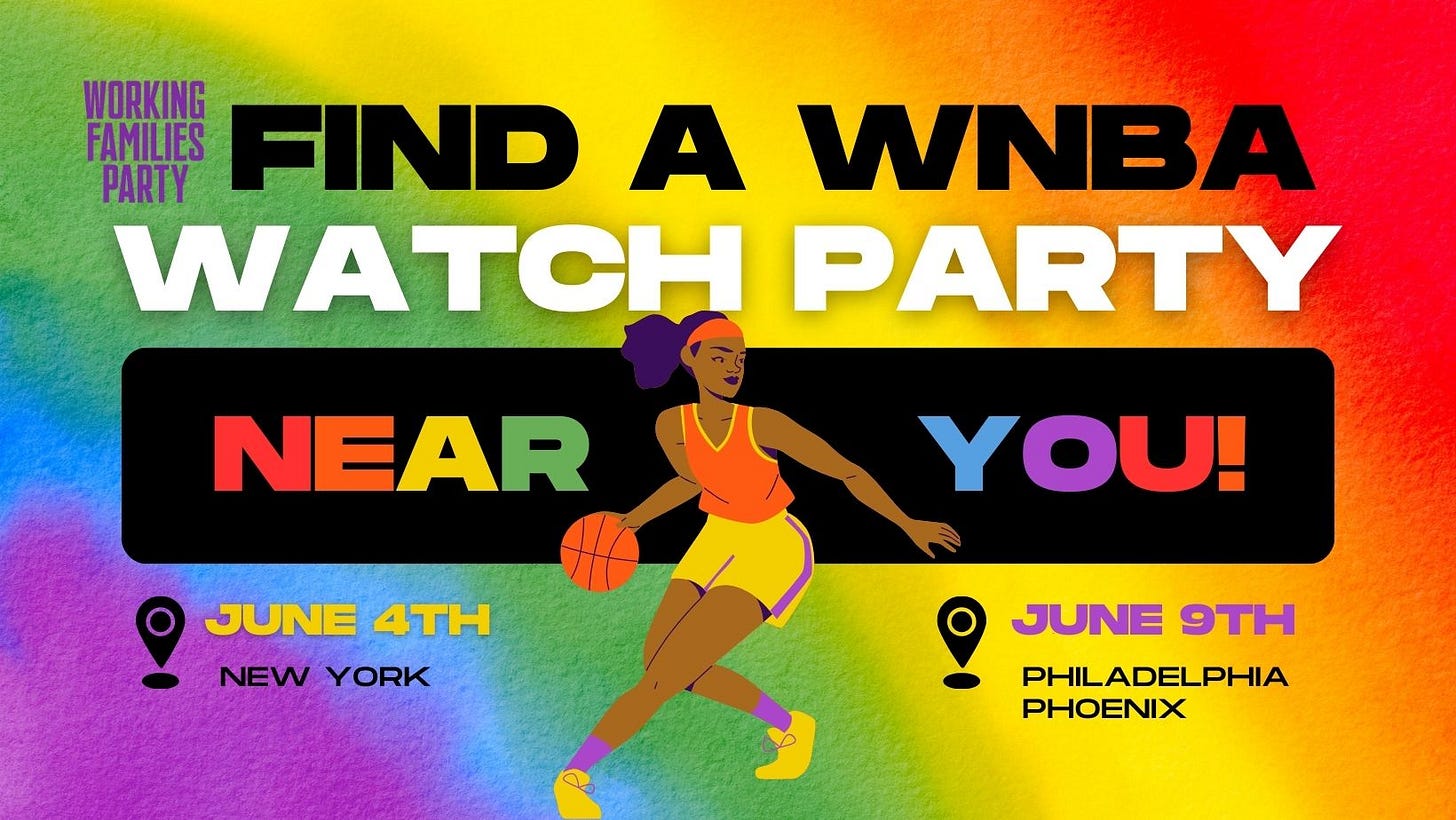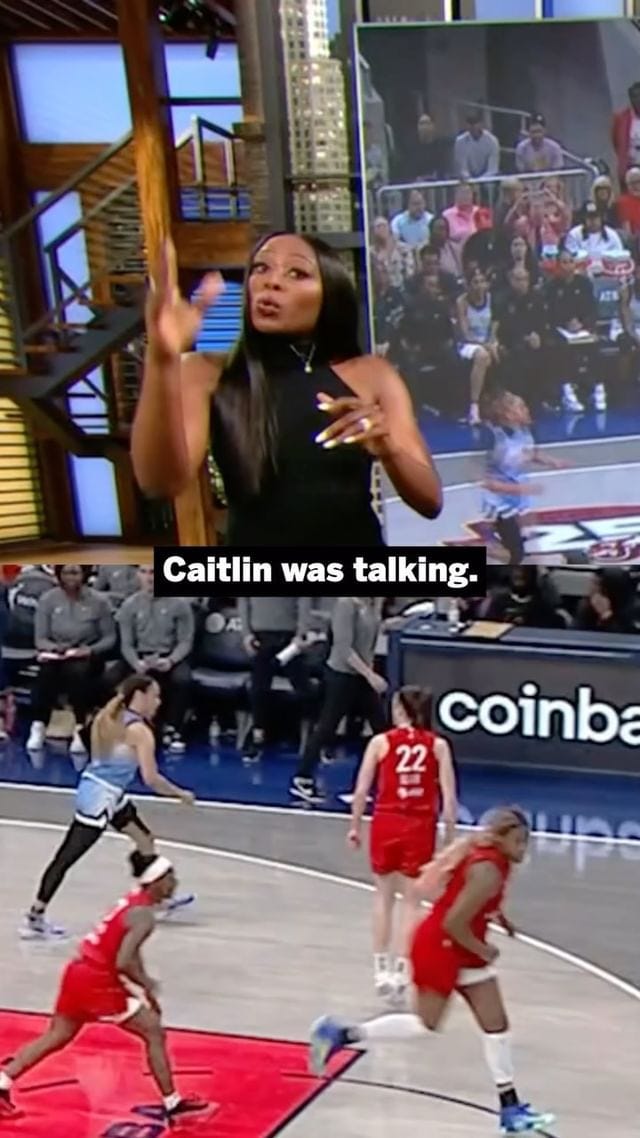Women in sports are done being grateful
Chennedy Carter hip-checked Caitlin Clark. Then men in sports media lost their minds.
Hi. How is everyone doing? I am assuming that, like me, many of you are exhausted right now. Because the past 48 hours of discourse around the WNBA has been absolutely, positively, mind-numbingly draining.
On April 30, I published a newsletter entitled, “Seismic change is coming to the WNBA. Brace for the aftershocks.” Well, the aftershocks are here. And even though I was the one issuing the warning signals, I’ve still found myself caught off guard by their intensity and frequency this early in the season.
This particular iteration of the news cycle began Saturday afternoon during a nationally-televised game between the Chicago Sky and the Indiana Fever. It was a much-hyped game, given it involved Caitlin Clark and Angel Reese’s first face-off in the pros, and the pro debut of the No. 3 overall draft pick and national champion, Kamilla Cardoso.
Before we go any further, let’s pause for a brief commercial break — and I mean that in the most literal sense. After 4.5 years, Power Plays has accepted our first paid sponsorship! I will write more about why I made the decision later this week, but I wanted to go ahead and introduce the sponsor: the Working Families Party (WFP).
The WFP has started to host “Basketball House” events, which seek “to build political power for the multiracial working class by creating community in our fandoms and making collective civic engagement convenient, accessible, and fun.” This week they are hosting WNBA watch parties in New York (tonight, June 4), Phoenix, and Philadelphia (June 9).
You can find out more about the watch parties and RSVP by clicking on the image above or clicking right here.
In the third quarter of the back-and-forth, physical affair between two young teams, Sky guard Chennedy Carter took an elbow to the head from Clark. Soon after, while waiting for Aliyah Boston to inbound the ball, Carter body checked Clark, knocking down the Fever star. It was an away-from-the-ball, completely unnecessary act that was only called a common foul in-game, though it was later (rightfully) upgraded by the league to a Flagrant 1.
In its aftermath, all of the tension and takes and frustration and fury from the first two weeks of the season reached a fever pitch. (Pun intended. I think.)
There have been about 20 conversations happening at once, but there’s a damning undercurrent through all of them: Why aren’t these women — especially these Black women — being more grateful? Why isn’t Chennedy Carter more grateful to Caitlin Clark? Why isn’t Monica McNutt more grateful for Stephen A. Smith allowing her permission to be on First Take? Why aren’t WNBA fans more grateful that the sport is getting increased attention?
Well, I have bad news for anyone waiting for thank-you notes: They’re not coming.
Let’s, unfortunately, start with First Take, where hosts Stephen A. Smith and Shannon Sharpe opened up their show with a forty-minute discussion about the foul on Monday morning. They said that Carter’s foul was a continuation of the on-court hammering Clark has gotten since the WNBA season began, that the root of the disproportionate physicality towards Clark is jealousy over her popularity and success, and that her teammates (Boston in particular) should be doing more to defend her. Their main takeaway? That the players and league as a whole should be treating Clark better because her popularity will bring them all a lot of money.
They should be more grateful.
The guest for the segment, former Georgetown women’s basketball star and current ESPN and MSG Network analyst Monica McNutt, did her best to force some nuance into the conversation.
“What has been frustrating for those of us who have covered the league for years, you can go back to Candace Parker’s rookie year, there has been physicality and welcome-to-the-league moments,” McNutt said. “That’s all. So making a blanket statement about the women in this league is unfair. Is there jealousy? Yes. But is the league and all of the players in the league hating on her? I do not think that is accurate.”
It would be both impossible and unproductive to summarize all of the tangents of the conversation — which included Smith expressing resentment for being told to “sit up here and watch every syllable” when talking about women’s sports, McNutt saying, “Welcome to the world of being a woman, Stephen A.,” and Smith responding, “How about being a Black man?” — but let’s hone in on the end of the segment.
As McNutt finished her thoughts, Smith said, presumably seriously, “Who talks about the WNBA, who talks about women’s sports more than First Take?”
McNutt and the moderator, Molly Qerim, looked at him stone-faced, dumbfounded at the words that just came out of his mouth. After a moment of well-earned silence, McNutt responded: “Stephen A., respectfully, with your platform, you could have been doing this three years ago if you wanted to.”
Smith did not take kindly to this comment. That evening on his radio show, he went on one of his signature rants: “Ever heard of Monica McNutt? You have now, cause she's on First Take a lot. Chiney Ogwumike? Absolutely wonderful, spectacular basketball analyst … WNBA player in her own right, ask her how it’s been on First Take. How about Andraya Carter, who’s a rising star in this business? How much do you think First Take helped that? What about Kimberly Martin? What about Molly Qerim herself?”
He continued by calling McNutt’s comment about his lack of WNBA coverage “highly offensive” and “factually incorrect.”
“I challenge anybody to find a show in sports television that discusses women’s issues, that highlights and profiles female analysts, more than First Take,” Smith said.
The not-so-subtle subtext of his challenge, which is so untethered from reality that I can’t even properly engage with it, was that he was doing charity work by giving women’s sports any space, no matter how limited, on First Take, and that by having talented female analysts on First Take, he made their careers. And McNutt had the gall to come onto his show and call him out?
Why isn’t she more grateful?

Smith wasn’t the only one scolding women for a lack of gratitude on Monday. On Twitter, former NBA player and current podcaster Matt Barnes on Twitter responded to Gina Paradiso, a WNBA agent, making a vague tweet about “male podcasters” talking about “women’s basketball” by telling her to “humble” herself and remember where she came from. Then, elsewhere on ESPN, Pat McAfee did an entire segment berating WNBA media and fans for giving the entire rookie class credit for growing interest in the game, rather than always giving Clark sole credit. Of course, he actually made things infinitely worse when he called Clark a “white bitch” while presumably praising her.
“I would like the media people that continue to say, ‘This rookie class, this rookie class, this rookie class,’ Nah. There’s one white bitch for the Indiana team who is a superstar,” he said. (He has since apologized.)
If we can get past the sexist slur — which is a phrase that proves just how out of control the discourse is — the root of his segment was, again, about gratitude.
Why isn’t WNBA media more grateful for Clark?
Gratitude is a loaded concept in women’s sports. For decades, athletes and coaches and fans have been told that they are charity cases, that they should be thankful for any scrap of attention or resources they receive. For decades, women have said “thank you” in public, and fought like hell for more in private. Women in sports, both in the booth and on the court, have built a four-course meal from the crumbs they’ve been given. And now, the men eating the delicious food they’ve toiled over for generations are mad that they’re not getting a medal of honor for coming to the table.
Clark has brought unprecedented attention to women’s basketball thanks to her electrifying, record-smashing play in college. It’s incredible. It’s undoubtedly going to lift the boat for everyone. But it’s not ungraciousness from the media to point out that she quite literally can’t do it alone — that’s not how sports work. It’s not hating to point out that the Aces have sold out 19 of 20 home games, the Washington Mystics had to move to a bigger arena for games agains Clark’s Fever *and* Reese’s Sky, and the Seattle Storm received a historic $156 million valuation a year before Clark entered the league. It’s not disrespectful to point out that the WNBA is a predominantly Black league, and that white players are covered differently than Black players. It’s telling a full story.
Clark doesn’t need sole credit; she needs media to robustly cover the league so it can continue to grow. She also doesn’t need tokens of appreciation from her opponents; she needs fierce competitors to push her to get better, superstars and healthy attendance in every market to keep the league’s value rising, and engaging rivalries to keep fans coming back from more. She’s not a philanthropist, she’s a baller.
As for the rest of us? Well, women’s sports fans certainly aren’t going to be appeased by coverage that begins and ends with one athlete in a league of 144, and we’re not going to throw a party for racist, sexist, and/or homophobic coverage, no matter how mainstream the platform.
And for goodness sake, McNutt and her female colleagues do not need to be indebted to Smith for inviting them onto his show. McNutt, Ogwumike, Qerim, Andraya Carter, Martin and every woman who has ever been on First Take has made the show better. He should be the one sending out the thank-you notes.
Women in sports are no longer performing gratitude in order to boost the egos of men.
When the Sky talked to press on Monday, there was no groveling for forgiveness. Carter told reporters she had “no regrets” for her foul against Clark — a statement that will not surprise anyone who has followed Carter’s career since college.
“I’m a competitor,” Carter said, as reported by the Chicago Sun-Times. “I’m going to compete no matter who you are, no matter who is in front of me. That’s just what [the foul] was. Heat of the moment play, we’re going back and forth. It’s basketball. It’s all hoops. After we finish the game, it’s all love.”
And Reese did not apologize for cheering for Carter after the foul, emphasizing that she was going to be there for her teammates, even if it was villainized.
“I’ll take that role. I’ll take the bad guy role and I’ll continue to take that and be that for my teammates,” Reese said.
This morning on First Take, both McNutt and Ogwumike joined Smith and Sharpe to open the show. The conversation hit many of the same points that it did yesterday, with Smith and Sharpe reiterating that WNBA players needed to be more grateful for Clark, Smith saying the league must “protect its Golden Goose,” and McNutt and Ogwumike trying to add more depth to the discussion.
But Ogwumike made it clear she heard Smith’s radio show.
“When you occupy a spot that isn’t exactly built for us … you need allies. And there are a lot of people that contribute to our success in these spaces,” she said, specifically pointing out Sharpe and Smith. “But when it comes down to who made us, who made me, Monica, Molly, I mean this is me personally, I’m made by God, I’m made by Peter and Ify Ogwumike, and by our hard work and ethic and also our perspective.”
For days, a collective of men in sports media have been the construction worker on a city street, yelling at the WNBA players and media, telling them they need to smile. Their refusal to do so? That’s the power shift.







Congrats on the sponsorship. And this is why I subscribe. Thank you for breaking this down succinctly and effectively. Maybe YOU should go on First Take. I know you'd be grateful :)
I really appreciate site your breakdown.. Thank you for this great piece of writing and commentary.
Which I could go tell Smith off. but you do it better so I'll quote you..